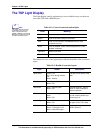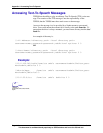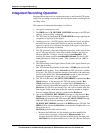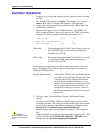
Appendix 12 Integrated Recording
CPSEE_TSP500 User Guide Version 4.0 Page 12-7
This document is confidential and proprietary to SER Solutions and is not for external use.
Components of Integrated Recording
Recording Agent conversations on the TSP500 requires the following compo-
nents:
• RAM Disk
• Recording Server
• Disk Monitor Daemon
• Recording Resource Manager
RAM Disk
You must create a RAM disk with at least a 400MB capacity to hold the tem-
porary snippets of audio. The file grub.conf, located in the /boot/grub direc-
tory, will be modified to allocate the memory needed for the RAM disk. New
entries in the /etc/rc.d/rc.local file will create the RAM disk at /mnt/rd dur-
ing boot-up.
These modifications take place when you install a recorder during a TSP500
upgrade. You must reboot the system after installation to activate the RAM
drive
Recording Server
To activate Integrated Recording, you must mount SAMBA to a shared drive
on a Recorder Server. The Recorder Server is the server that will archive the
completed recordings. The Recorder Server will be referred to as the Rec-
Server in this document.
On Linux, you would mount the shared drive using an entry in the fstab file
in the /etc directory. This entry requires an IP address or “nodename”.
Although this could vary from site to site, the TSP software installation will
configure a default “nodename” (recserv), and IP address on the 199 network
(199.199.199.220).
If a different IP address, and “node name” is required, it can be reconfigured
during the installation, or afterwards, using the “rec_watch_setup” program
located in the /usr/home/cpstsp/cps01/utl/exe directory.
Table 12-1: Files modified during installation.
File Directory Comment
fstab /etc Add mount statement
hosts /etc Add “nodename” and IP address of the Rec-
Server
.tsp_profile /usr/home/cpstsp Add environment variables.


















